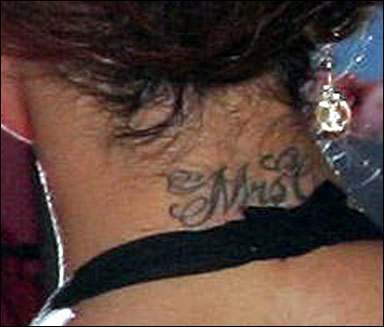Cheryl Cole and the liquidity paradox
This may be the first time I've linked to a story in The Sun, but it illustrates a striking economic puzzle, so here goes:
This goes against all standard microeconomic theory, which strongly implies that cash transactions should be more efficient than barter. Cash is a fungible asset, highly granular, and any transaction involving other assets will be an imperfect match for the agent's preferences, reducing the available consumer surplus.
What could be the explanation for this?
Whatever the right answer (and it's probably a combination), this apparent paradox of liquidity illuminates some interesting features of real markets which rarely find their way into the microeconomics discipline.
[article continues below this slightly disturbing yet appealing picture]
The article goes on to criticise Ashley:
Finally it appears that Cheryl, who plans to revert to her maiden name, Tweedy:
"[Cheryl Cole] will not be fighting for a huge settlement. She just wants to get out fast so she can press on with life and move on.
"The initial advice is that it speeds up the process if there is no claim for money"...Cheryl hopes to keep the couple's £6million home.So wait...this transaction will be more liquid with lower transaction costs if it takes place in property instead of cash?
This goes against all standard microeconomic theory, which strongly implies that cash transactions should be more efficient than barter. Cash is a fungible asset, highly granular, and any transaction involving other assets will be an imperfect match for the agent's preferences, reducing the available consumer surplus.
What could be the explanation for this?
- Cheryl could be rationally giving up a potential material gain simply to reduce likely negotiation and transaction costs. This might result in a net benefit if the legal fees, time and stress would be greater than the share of Ashley's money that she might get. However, he's supposed to be worth £14 million (plus £4 million a year in salary) and he appears to be (or is painted as being) unequivocally at fault - meaning she'd probably make a big profit by fighting - unless she assigns an unrealistically high cost to the emotional stress of the contest.
- The endowment effect might increase her subjective valuation of the house, making it (strictly speaking, his half of it) more valuable to her than £7 million of cash. Supporting this, I ran a test of the endowment effect last week with the result that the subjects valued their own asset an average of five times higher than an identical object owned by another person.
- The benefit of the transaction might be primarily social rather than material - symbolising Cheryl's victory over Ashley in the public eye - meaning that the iconic value of the marital home more than outweighs any dimunition in utility from the good. At first it seems intuitively appealing that her fame and public image would be worth more than the cash. But then again, this is a woman who, according to Facebook, is barely more popular than a sausage roll.
- Or there could be a cognitive explanation based on uncertainty over preferences. Cheryl presumably has a good idea of the value she gets from the house, as she lives in it. She may also have a clear idea of her current marginal utility from wealth - how much happier will one more pound make her? But she has no way of knowing what utility she'll gain from wealth once she has £7 million more in the bank. Perhaps after another half million her utility from wealth will drop off a cliff and the next £6.5 million will hardly make her happier at all. In which case she'd be better off just taking the house. While it's hard to make an informed case for believing in that kind of utility curve, it's quite plausible for a person to have such a lack of visibility of their own preferences.
Whatever the right answer (and it's probably a combination), this apparent paradox of liquidity illuminates some interesting features of real markets which rarely find their way into the microeconomics discipline.
[article continues below this slightly disturbing yet appealing picture]
image from daily mail
The article goes on to criticise Ashley:
"as more shabby revelations emerged about his links with five girls."which is all very well, but a bit rich given that Cheryl has her own widely reported "links with five girls" (see the link for photographic evidence).
Finally it appears that Cheryl, who plans to revert to her maiden name, Tweedy:
may return to America to have the "Mrs C" tattoo on the back of her neck removed.Note, however, her foresight in having included just Ashley's initial in the tattoo. This opens up the opportunity for her to reduce pain and trouble by hooking up with another partner whose last name also begins with C. Not that I'm suggesting anyone in particular - just saying...



Comments
youtube dot com/thisisjohnnyblack